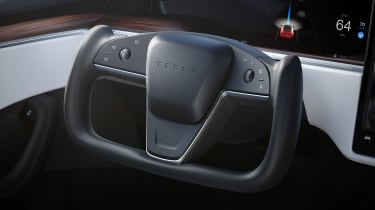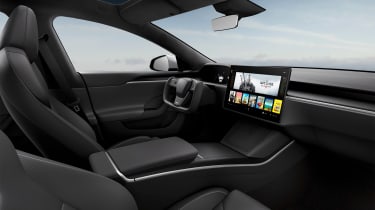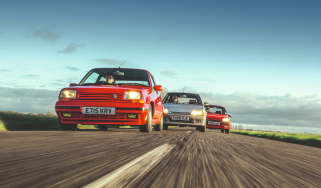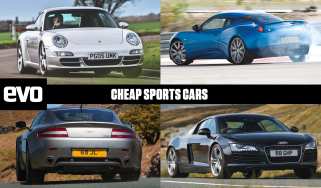‘Tesla's yoke is a deliberate poke in the eye to people like us’
Reinventing the (steering) wheel is a delicate business, explains Meaden

We all know Elon Musk and Tesla are arch courtiers of controversy, but when the Model S Plaid appeared with a yoke steering wheel it signalled more than just a knack for provocative actions.
It’s no secret that in his evangelical pursuit and premature promotion of Level 5 full self-driving autonomous technology, Musk would ultimately love to do away with the steering wheel altogether. Severing the connection between car and driver would be emotive in the extreme – a glorious coup de grâce for the man who would have us all rendered passengers in machines controlled by algorithms rather than hand-eye co-ordination.
Weirdly, given it’s a vital and primary point of connection with the car we’re driving, it’s surprising how few steering wheels feel really good in your hands, with many either looking a mess or simply not feeling right. You’d think there would be a perfect blueprint by now, but it often seems the steering wheel gets little more than cursory attention.
> Tesla Model S Plaid given new Track Mode – top speed lifted to 175mph
Yet the steering wheel can also sometimes become the focus of unusual attention. I remember when BMW’s E46 M3 was launched and we all shook our heads at the fatness of the steering wheel’s rim. Girth is never a good word to resort to in any context, least of all a magazine road test, but for a while it dominated the M3 conversation.
It’s fair to say airbags ruined steering wheel aesthetics, with their big, unsightly slabs of plastic. You only need to compare the pre- and post-airbag steering wheels fitted to the Ferrari 355 to understand why the earlier cars are so much more desirable. Then as airbags became more discreet, car designers indulged an unhealthy obsession with motorsport ergonomics. First came paddleshift, then volume controls and starter buttons and shift lights. It was all getting a bit much, but then Ferrari introduced the manettino and it was impossible not to love the tactility and practicality of the little rotary switch. When they added the ‘Bumpy Road’ push function it made a great innovation even better.
You can have too much of a good thing, though. Fast-forward to the SF90 and we now have a Ferrari wheel with controls for almost every aspect of the car. There’s even a miniaturised track pad such as you’ll find on a laptop, plus touch-sensitive switches for various powertrain modes, and more buttons and switches for the indicators, wipers, lights, hi-fi, satnav and air-con. Some of the simpler controls are intuitive, but there’s way too much going on, at least for my limited processor and digits to handle.

But not all F1 influence is bobbins. You need only look to Maranello’s rivals in Woking to appreciate how purity and geeky attention to detail can triumph over slavish worship of tech. When the 12C was introduced it featured a steering wheel with a rim profile informed by CAD models from some of McLaren’s World Championship-winning GP cars, and had rocker paddles that could be pulled or pushed for up and downshifts, just like the F1 cars’. A decade on, the wheels in McLaren road cars remain refreshingly free from distracting controls and are uniquely satisfying to grip.
At the more humble end of the spectrum the Mk1 Mazda MX‑5’s Nardi wheel always looked and felt great. Conversely the Phase 1 Renault Sport Clio 172’s wheel featured a rather odd rubber covering that seemed to get slipperier with use. Of today’s affordable performance cars the GR Yaris’s wheel is pleasingly business-like, but looks a bit heavy.
We Brits remain mildly obsessed with the ‘quartic’ wheel fitted to the Austin Allegro, but some oddities actually work really well. Foremost amongst these is the Aston Martin One-77’s wheel, the faceted rim of which looked awkward (and Allegro-inspired) but sat brilliantly in your hands. The opposite of this is the Aston Martin Vulcan, which features a yoke of such sculptural beauty it is a true work of art, yet it feels uncomfortably alien to use. Race car responses and lots of downforce mean the Vulcan isn’t likely to need much in the way of steering lock or dabs of oppo, so you tend to keep your hands locked to the grips, but the open-topped oblong just seems intimidating to use.
As for aftermarket steering wheels, well, the undisputed daddy is surely the Momo Prototipo. First fitted to sports prototype race cars in the mid-to-late ’60s, its simple three-spoke design complete with perfect stitching and wonderfully yielding leather rim has become a true icon. That Rob Dickinson – proprietor of Porsche reimaginers Singer and self-confessed pedant – chose the Prototipo for his fastidious creations speaks volumes.
So Elon’s yoke is a deliberate poke in the eye to people like us. The Teslarati might feel compelled to take to social media in order to demonstrate how he has literally reinvented the wheel, but so long as we remain the masters of our machines nothing will beat the precision of a perfect circle.


